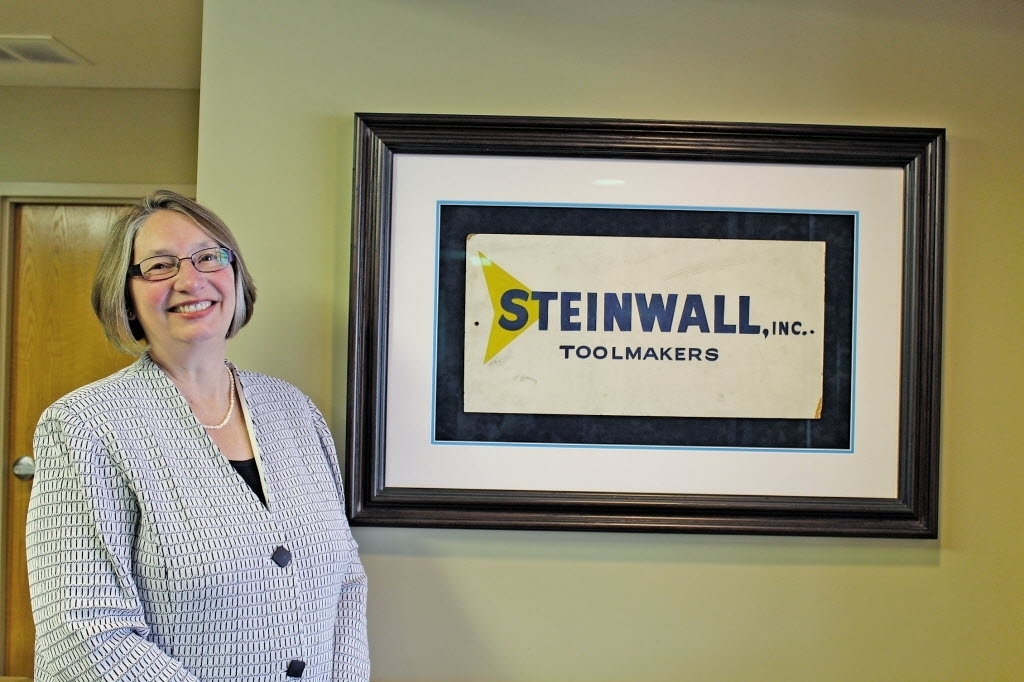November 27, 2015
Email Print

Jeremy Carroll Maureen Steinwall entered the Plastics Hall of Fame earlier this year.
Maureen Steinwall is the ultimate people person.
She has told her story countless times in Plastics News — when she went into the Plastics Hall of Fame at NPE this year, and when Steinwall Inc., her custom injection molder, won the 2011 Processor of the Year Award.
Under her leadership, the molder in Coon Rapids, north of Minneapolis, pioneered the use of iPads at each press running PowerPoint videos, showing details of molding, inspecting and packaging every single part Steinwall makes. She did away with the three-ring binder and static photos years ago.
Now, Steinwall, which has 135 employees, has four full-time people dedicated to making the videos, and measuring the results. All 50 presses have the tablet computers, as do secondary operations. The company also produces self-directed Orient Me! videos, short segments for new hires.
But employee involvement goes beyond an iPad. As always, Steinwall looks at the whole picture, something that comes naturally for the executive who wrote her Ph.D. dissertation on “Multimedia Training of Optimism Competencies.”
She lists five steps that have to happen for the iPads project to be effective. First, you have to notice that something needs to be documented. They you document it, then you archive the information. It gets transferred to the employee. Finally, you audit the results — and make necessary changes. Auditing is the part many companies leave out, she said: “What good is it if they don’t apply it?”
It sounds like something an engineer would say when a company gets a new piece of equipment. But Maureen Steinwall, 61, is talking about people. “We have one person who does nothing but go around to be sure that what is being displayed [in the iPads] is being produced,” she said. And the operator can hit a button on the iPad and type in a problem, sending the information to a knowledge management coordinator.
“It’s a circle. It’s got to be a continuous flow of documenting and reviewing, and documenting and reviewing,” she said.
Maureen Steinwall bought the molding company from her father, Carl Steinwall, in 1987. But her professional career began much earlier, at Honeywell Inc.’s Micro Switch Division in Freeport, Ill. Asked to name her most interesting or unusual job, she said it was working on a team that developed the solid state Hall effect, which used digital technology to replace points in the ignition timing for cars. She handled market research for the team, which worked with Bosch GmbH and Ford Motor Co.
The solid state technology expanded to other applications, including ATMs and joy sticks for video games. One has to withstand snow and rain. The other, pumped-up gamers.
When Honeywell offered her a promotion — running the third shift of a factory in New Mexico — she called her father for advice. He said to take the job. Since she had an accounting degree, her dad, who was looking to retire, also asked her “How do you sell a business?” Maureen said: “You sell it to your daughter!”
In a three-minute conversation, her dad agreed. “He just went, ‘Oh my God, you’d be perfect for it.’” She took a leave of absence at Honeywell to help, and became vice president of Steinwall Inc. in 1983, so her father could show her the ropes. “I loved it — absolutely loved it.”
She became president in 1985, and two years later, bought the company.
Maureen Steinwall is known for fostering a humanistic culture. And she strongly believes in ethics. “Avert lying” makes her cringe.
“There’s a couple of things that are non-negotiable behaviors here at Steinwall. In corporate America, it appears to me after working in business for 40 years that sometimes people will do and say anything to get the order. Or do or say anything to avoid conflict,” she said. “At Steinwall you just don’t ever violate the honesty/truth principle.”
She teaches online MBA classes at the University of Phoenix. Business schools do teach ethics, but the reality is the students get jobs and at some point, face a decision that challenges ethical behavior. It’s just business.
Big companies pay such high salaries that their key employees can become what she calls financial slaves. “So I tell my students, don’t ever take a job where you find yourself a slave,” she said.
Ethical business behavior comes from the top down, starting with the CEO, she said.
“And to think it’s just business, so that gives you permission to violate humanistic decisions, I find that to be irresponsible leadership,” she said.
Maureen Steinwall said she has been at many crossroads where she could have gained business by letting go of some principles. “But I can go to my grave knowing that when decisions were made at Steinwall, they were made from the values and principles of running a solid organization based on truth. I’m not going to my grave being the wealthiest woman in the plastics industry, however.”
Read more about PN’s CEO project and find links to other profiles.



























